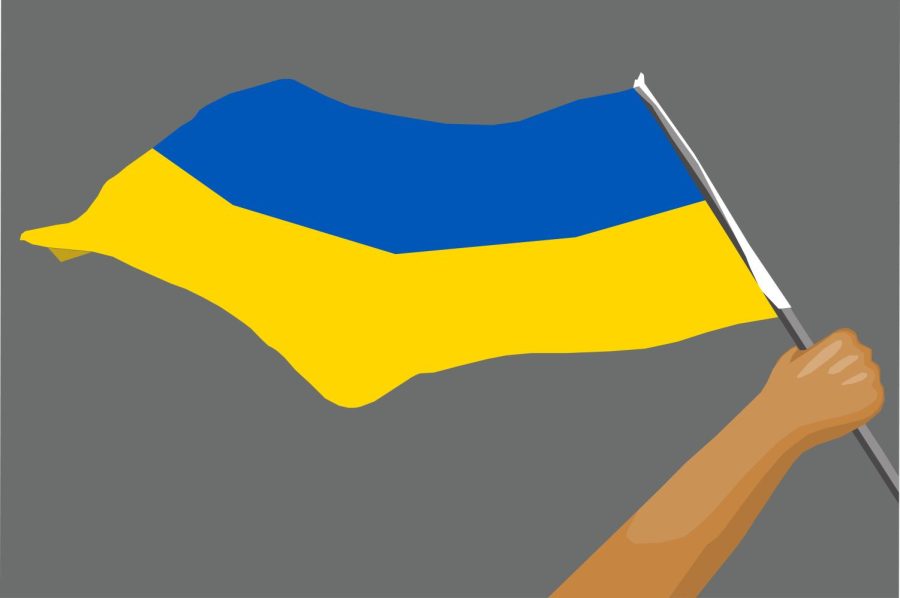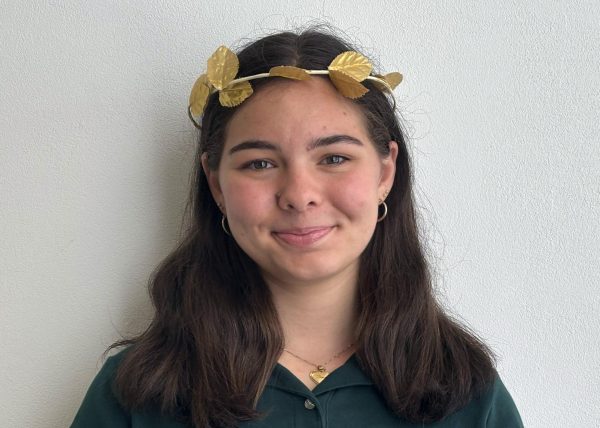Students, faculty express concerns, share opinions on anniversary of Ukraine conflict
The Ukrainian flag is raised into the air following a year of Russian attacks. Russia’s initial invasion along Ukraine’s eastern border escalated one year ago Feb. 24, 2022. Graphic design by Maia Alvarez
February 24, 2023
After a year of devastation and destruction, today, Feb. 24, marks the one year anniversary of the Russian invasion of Ukraine. The invasion, which is considered the largest land war in Europe since World War II, is a manifestation of many years of tension between the two countries.
In an attempt to better understand the Archer community’s knowledge of the crisis in Ukraine, The Oracle sent a survey to the student body and faculty members. The survey’s goal was to assess the community’s understanding of the war, as well as reevaluate the crisis’ importance after a year of Russian attacks. Out of 502 students and 69 faculty members, the survey garnered 88 responses.
The survey found that 75% of responders were unaware Feb. 24 marks one year of war in Ukraine, and only 5.7% of responders have been paying close attention to recent updates on the crisis. Freshman Tatiana Bojeczko said her own Ukrainian heritage compelled her to complete the survey. For her, the importance of the crisis was especially amplified after meeting a Ukrainian refugee at a tennis event last summer. Bojeczko expressed concern about how rarely she hears people discuss the current state of the war in contrast to the initial escalation in 2022.
“I feel like no one is actually talking about it because it’s been a year,” Bojeczko said. “They’re more talking about the [escalation] that happened last year.”
Parallel to Bojeczko’s cultural ties to the crisis, history teacher, DEI specialist and instructional coach Dr. Elana Goldbaum said one of the main reasons the crisis is of such importance to her has to do with her own Jewish identity and the larger undercurrent of antisemitism behind Russia’s invasion. Ukraine has a large Jewish population, and President of Ukraine Volodymyr Zelensky identifies as Jewish himself.
Goldbaum also teaches a seminar on historic occurrences of genocide and restorative justice, and she said that she’s noticed similarities between the war in Ukraine and past genocides.
“There are aspects of the invasion that overlap with components of genocide,” Goldbaum said. “We hear things about Ukrainian children being sent to re-education camps in Russia, and that’s one of the characteristics of genocide.”
Sixth grader Samaira Modgil said she still considers the war both important and relevant a year after the initial invasion. However, Modgil said that social media influencers sharing posts about the war in Ukraine on their Instagram stories and making brief TikTok videos calling for action can ultimately prove meaningless, and that the intentions behind these actions are often selfish.
“I feel like most influencers will just say that they think it’s important just to get more followers and likes, so people will actually pay attention to them,” Modgil said. “But, they don’t actually care.”
Similarly to Modgil, history teacher Nicholas Graham commented on the portrayal of the crisis in the media, and he argued that there is still some “grey area” major news outlets are not covering.
“My suspicion is that this war is going far, far worse for Ukraine than we’re actually being told,” Graham said.
Graham also said that the war’s importance to him has increased exponentially as the crisis continues to worsen, and in order to truly comprehend the magnitude of the conflict, understanding the layered history between Russia and Ukraine is key.
“The history is really, really crucial,” Graham said. “Not just Russia’s history, going back to 1945, but Ukraine’s history in recent years … it has [become] a country whose identity is almost at stake.”
Correction Statement:
(February 25, 2023, 8:20 p.m.): A previous version of this article did not include the context of the larger undercurrent of antisemitism behind Russia’s invasion of Ukraine as mentioned by Dr. Elana Goldbaum. The article has been revised to include this information and relevant context.









